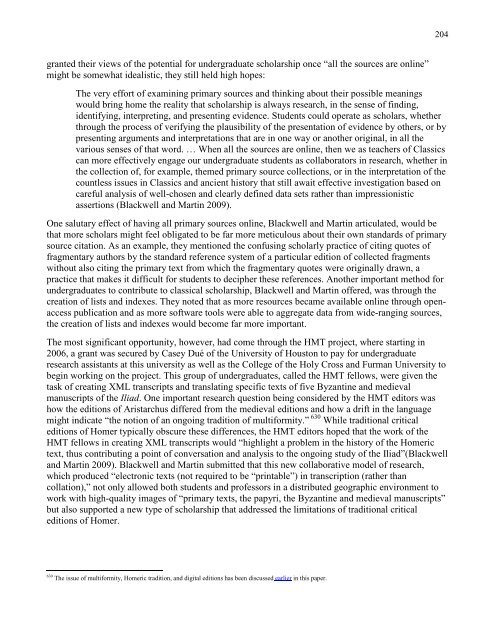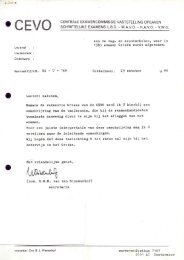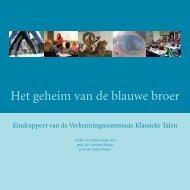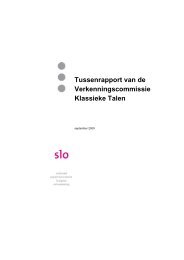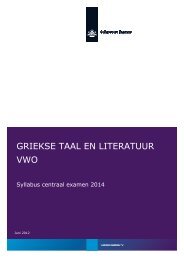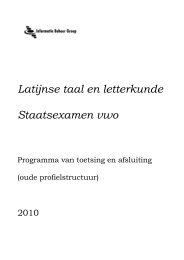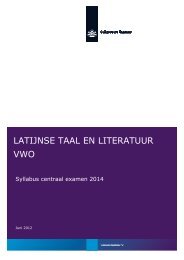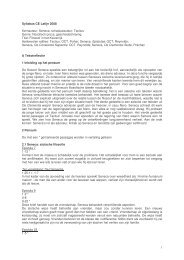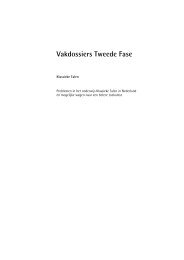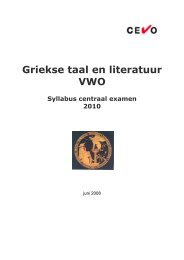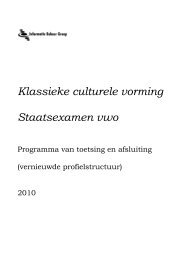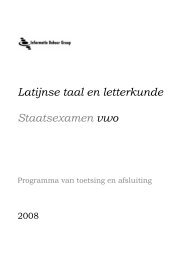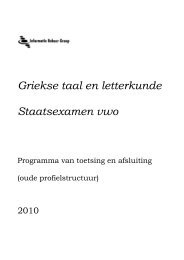Rome Wasn't Digitized in a Day - Council on Library and Information ...
Rome Wasn't Digitized in a Day - Council on Library and Information ...
Rome Wasn't Digitized in a Day - Council on Library and Information ...
Create successful ePaper yourself
Turn your PDF publications into a flip-book with our unique Google optimized e-Paper software.
204<br />
granted their views of the potential for undergraduate scholarship <strong>on</strong>ce “all the sources are <strong>on</strong>l<str<strong>on</strong>g>in</str<strong>on</strong>g>e”<br />
might be somewhat idealistic, they still held high hopes:<br />
The very effort of exam<str<strong>on</strong>g>in</str<strong>on</strong>g><str<strong>on</strong>g>in</str<strong>on</strong>g>g primary sources <strong>and</strong> th<str<strong>on</strong>g>in</str<strong>on</strong>g>k<str<strong>on</strong>g>in</str<strong>on</strong>g>g about their possible mean<str<strong>on</strong>g>in</str<strong>on</strong>g>gs<br />
would br<str<strong>on</strong>g>in</str<strong>on</strong>g>g home the reality that scholarship is always research, <str<strong>on</strong>g>in</str<strong>on</strong>g> the sense of f<str<strong>on</strong>g>in</str<strong>on</strong>g>d<str<strong>on</strong>g>in</str<strong>on</strong>g>g,<br />
identify<str<strong>on</strong>g>in</str<strong>on</strong>g>g, <str<strong>on</strong>g>in</str<strong>on</strong>g>terpret<str<strong>on</strong>g>in</str<strong>on</strong>g>g, <strong>and</strong> present<str<strong>on</strong>g>in</str<strong>on</strong>g>g evidence. Students could operate as scholars, whether<br />
through the process of verify<str<strong>on</strong>g>in</str<strong>on</strong>g>g the plausibility of the presentati<strong>on</strong> of evidence by others, or by<br />
present<str<strong>on</strong>g>in</str<strong>on</strong>g>g arguments <strong>and</strong> <str<strong>on</strong>g>in</str<strong>on</strong>g>terpretati<strong>on</strong>s that are <str<strong>on</strong>g>in</str<strong>on</strong>g> <strong>on</strong>e way or another orig<str<strong>on</strong>g>in</str<strong>on</strong>g>al, <str<strong>on</strong>g>in</str<strong>on</strong>g> all the<br />
various senses of that word. … When all the sources are <strong>on</strong>l<str<strong>on</strong>g>in</str<strong>on</strong>g>e, then we as teachers of Classics<br />
can more effectively engage our undergraduate students as collaborators <str<strong>on</strong>g>in</str<strong>on</strong>g> research, whether <str<strong>on</strong>g>in</str<strong>on</strong>g><br />
the collecti<strong>on</strong> of, for example, themed primary source collecti<strong>on</strong>s, or <str<strong>on</strong>g>in</str<strong>on</strong>g> the <str<strong>on</strong>g>in</str<strong>on</strong>g>terpretati<strong>on</strong> of the<br />
countless issues <str<strong>on</strong>g>in</str<strong>on</strong>g> Classics <strong>and</strong> ancient history that still await effective <str<strong>on</strong>g>in</str<strong>on</strong>g>vestigati<strong>on</strong> based <strong>on</strong><br />
careful analysis of well-chosen <strong>and</strong> clearly def<str<strong>on</strong>g>in</str<strong>on</strong>g>ed data sets rather than impressi<strong>on</strong>istic<br />
asserti<strong>on</strong>s (Blackwell <strong>and</strong> Mart<str<strong>on</strong>g>in</str<strong>on</strong>g> 2009).<br />
One salutary effect of hav<str<strong>on</strong>g>in</str<strong>on</strong>g>g all primary sources <strong>on</strong>l<str<strong>on</strong>g>in</str<strong>on</strong>g>e, Blackwell <strong>and</strong> Mart<str<strong>on</strong>g>in</str<strong>on</strong>g> articulated, would be<br />
that more scholars might feel obligated to be far more meticulous about their own st<strong>and</strong>ards of primary<br />
source citati<strong>on</strong>. As an example, they menti<strong>on</strong>ed the c<strong>on</strong>fus<str<strong>on</strong>g>in</str<strong>on</strong>g>g scholarly practice of cit<str<strong>on</strong>g>in</str<strong>on</strong>g>g quotes of<br />
fragmentary authors by the st<strong>and</strong>ard reference system of a particular editi<strong>on</strong> of collected fragments<br />
without also cit<str<strong>on</strong>g>in</str<strong>on</strong>g>g the primary text from which the fragmentary quotes were orig<str<strong>on</strong>g>in</str<strong>on</strong>g>ally drawn, a<br />
practice that makes it difficult for students to decipher these references. Another important method for<br />
undergraduates to c<strong>on</strong>tribute to classical scholarship, Blackwell <strong>and</strong> Mart<str<strong>on</strong>g>in</str<strong>on</strong>g> offered, was through the<br />
creati<strong>on</strong> of lists <strong>and</strong> <str<strong>on</strong>g>in</str<strong>on</strong>g>dexes. They noted that as more resources became available <strong>on</strong>l<str<strong>on</strong>g>in</str<strong>on</strong>g>e through openaccess<br />
publicati<strong>on</strong> <strong>and</strong> as more software tools were able to aggregate data from wide-rang<str<strong>on</strong>g>in</str<strong>on</strong>g>g sources,<br />
the creati<strong>on</strong> of lists <strong>and</strong> <str<strong>on</strong>g>in</str<strong>on</strong>g>dexes would become far more important.<br />
The most significant opportunity, however, had come through the HMT project, where start<str<strong>on</strong>g>in</str<strong>on</strong>g>g <str<strong>on</strong>g>in</str<strong>on</strong>g><br />
2006, a grant was secured by Casey Dué of the University of Houst<strong>on</strong> to pay for undergraduate<br />
research assistants at this university as well as the College of the Holy Cross <strong>and</strong> Furman University to<br />
beg<str<strong>on</strong>g>in</str<strong>on</strong>g> work<str<strong>on</strong>g>in</str<strong>on</strong>g>g <strong>on</strong> the project. This group of undergraduates, called the HMT fellows, were given the<br />
task of creat<str<strong>on</strong>g>in</str<strong>on</strong>g>g XML transcripts <strong>and</strong> translat<str<strong>on</strong>g>in</str<strong>on</strong>g>g specific texts of five Byzant<str<strong>on</strong>g>in</str<strong>on</strong>g>e <strong>and</strong> medieval<br />
manuscripts of the Iliad. One important research questi<strong>on</strong> be<str<strong>on</strong>g>in</str<strong>on</strong>g>g c<strong>on</strong>sidered by the HMT editors was<br />
how the editi<strong>on</strong>s of Aristarchus differed from the medieval editi<strong>on</strong>s <strong>and</strong> how a drift <str<strong>on</strong>g>in</str<strong>on</strong>g> the language<br />
might <str<strong>on</strong>g>in</str<strong>on</strong>g>dicate “the noti<strong>on</strong> of an <strong>on</strong>go<str<strong>on</strong>g>in</str<strong>on</strong>g>g traditi<strong>on</strong> of multiformity.” 630 While traditi<strong>on</strong>al critical<br />
editi<strong>on</strong>s of Homer typically obscure these differences, the HMT editors hoped that the work of the<br />
HMT fellows <str<strong>on</strong>g>in</str<strong>on</strong>g> creat<str<strong>on</strong>g>in</str<strong>on</strong>g>g XML transcripts would “highlight a problem <str<strong>on</strong>g>in</str<strong>on</strong>g> the history of the Homeric<br />
text, thus c<strong>on</strong>tribut<str<strong>on</strong>g>in</str<strong>on</strong>g>g a po<str<strong>on</strong>g>in</str<strong>on</strong>g>t of c<strong>on</strong>versati<strong>on</strong> <strong>and</strong> analysis to the <strong>on</strong>go<str<strong>on</strong>g>in</str<strong>on</strong>g>g study of the Iliad”(Blackwell<br />
<strong>and</strong> Mart<str<strong>on</strong>g>in</str<strong>on</strong>g> 2009). Blackwell <strong>and</strong> Mart<str<strong>on</strong>g>in</str<strong>on</strong>g> submitted that this new collaborative model of research,<br />
which produced “electr<strong>on</strong>ic texts (not required to be “pr<str<strong>on</strong>g>in</str<strong>on</strong>g>table”) <str<strong>on</strong>g>in</str<strong>on</strong>g> transcripti<strong>on</strong> (rather than<br />
collati<strong>on</strong>),” not <strong>on</strong>ly allowed both students <strong>and</strong> professors <str<strong>on</strong>g>in</str<strong>on</strong>g> a distributed geographic envir<strong>on</strong>ment to<br />
work with high-quality images of “primary texts, the papyri, the Byzant<str<strong>on</strong>g>in</str<strong>on</strong>g>e <strong>and</strong> medieval manuscripts”<br />
but also supported a new type of scholarship that addressed the limitati<strong>on</strong>s of traditi<strong>on</strong>al critical<br />
editi<strong>on</strong>s of Homer.<br />
630 The issue of multiformity, Homeric traditi<strong>on</strong>, <strong>and</strong> digital editi<strong>on</strong>s has been discussed earlier <str<strong>on</strong>g>in</str<strong>on</strong>g> this paper.


